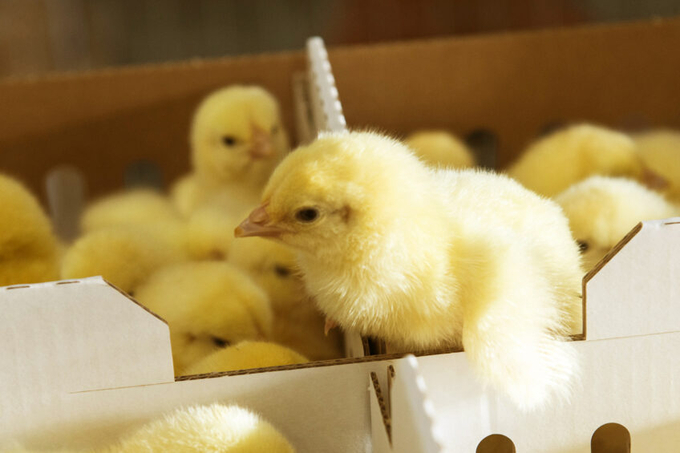December 30, 2025 | 15:35 GMT +7
December 30, 2025 | 15:35 GMT +7
Hotline: 0913.378.918
December 30, 2025 | 15:35 GMT +7
Hotline: 0913.378.918

Photo: Aviagen.
Tim Burnside, vice president of Welfare, Sustainability and Compliance at Aviagen Group, highlighted the connection between science and chick transport at the European Live Poultry and Poultry Hatching Egg Association General Assembly. His presentation focused on what chicks need to keep them healthy and comfortable during their journey from the hatchery to the customer. This article gives a summary of Tim’s key points.
We also invite you to check out our animation, where you will see firsthand how Aviagen transports chicks around the world with diligence and care.
Tim explained that chicks carry an internal yolk sac at hatch. The residual yolk weighs between 4 and 5 grammes, and this is sufficient to sustain them until their first feed. While growth rates post-hatch have advanced over the years, the way chicks utilise the yolk sac remains unchanged.
Although young chicks are self-sufficient in their nutritional needs in the first few days, they cannot regulate their body temperature and are thus sensitive to their environment. That’s why maintaining proper environmental conditions during holding and transport is crucial. For a desired vent temperature of between 39.4°C and 40.6°C, the box temperature should be at around 30°C.
Tim shared insights from 2 independent studies with Ankara University in Turkey where 19,200 chicks were held up to 72 hours in an actual chick transport truck. The trial ended 7 days after each group of birds had been placed on the farm.
The main finding across the trials was that livability was not affected by simulated journey times of 60 hours or less.
In the first trial, they tested 2 groups of chicks – one with a hydration supplement and one without. The results showed that there wasn’t much difference between the groups, meaning the yolk sac can keep chicks going for up to 72 hours as long as the environment is right.
The second study compared chicks with different incubation periods – one group with the usual incubation time and another with an extra 12 hours. Overall, no large differences in livability were found. However, chicks with shorter incubation periods had larger yolk sacs, which makes them better for long-distance trips. Meanwhile, chicks with longer incubation periods had smaller yolk sacs, so they’re better suited for shorter journeys.
While chicks can sustain themselves nutritionally for the first few days, they need help maintaining their body temperature. That’s why we make significant investments to ensure their comfort during transport:
We also use real-time temperature tracking to monitor conditions during the chicks’ journey, with data sent directly to our export team.
The international poultry sector takes the lead with airlines as part of the Air Cargo Poultry and Hatching Eggs Roundtable meetings, involving 95% of airlines that ship chicks and eggs. At Aviagen, our global export team engages with the International Air Transportation Association (IATA) to establish global standards for bird welfare during transport.
Because everyone has an impact on welfare, we train airline and freight forwarding professionals on the unique needs of day-old chicks and how to properly handle and care for them. This training is supported by comprehensive guidelines on transporting chicks and eggs we’ve developed as a sector.
Moving day-old chicks safely is a complex process that requires careful attention to their unique needs. We transport our birds to customer farms across the continents, making sure they travel in the best-possible conditions by road, sea and air.
By keeping temperatures just right for their needs, providing thorough training to everyone who handles them, and pushing for global standards to ensure their best interests are met, we strive to achieve excellence in bird welfare throughout this critical process. This careful approach helps ensure a steady supply of robust chicks, which in turn supports poultry producers in feeding their communities with nutritious, affordable and sustainable chicken meat.
(PW)

(VAN) From emissions cuts to energy sovereignty, France’s president reflects on COP21's legacy.

(VAN) A Yale University poll from earlier this month says most Americans see climate change as playing a role in hurting prices and the cost of living.

(VAN) According to the National Food and Strategic Reserves Administration, this year's autumn grain entered the market earlier and boasts good quality.

(VAN) The Trade Policy and Strategy Office (TPSO) under the Commerce Ministry reported that exports in November 2025 were worth US$27.445 billion, expanding for a 17th consecutive month at 7.1%.

(VAN) Ukraine’s leading poultry processor and exporter, MHP, plans to kick off a trial production of insect meal in the first quarter of 2026, as revealed by Serhiy Melnychuk, scientific advisor to the chairman of MHP.

(VAN) Researchers have warned of the unexpected consequences of extremely hot, humid conditions during pregnancy.

(VAN) A group of Iranian scientists from the National Institute of Genetic Engineering and Biotechnology claimed that they have developed a technology that allows effective processing of poultry feathers into meal using a Bacillus strain.